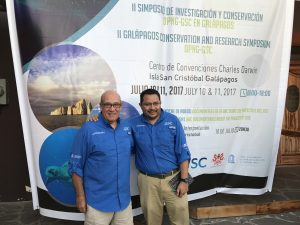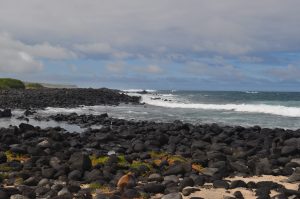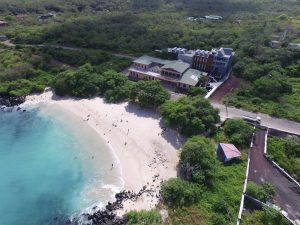Dr. Stephen J. Walsh is a Distinguished Emeritus Professor and Research Professor of Geography at the University of North Carolina at Chapel Hill as well as the founding Emeritus Director of the Center for Galapagos Studies and the Galapagos Science Center. For Valentine’s Day this year, Dr. Walsh shares why he loves the Galapagos Islands.

Partnership building is at the heart of a successful global program that seeks to address grand challenges and to make lasting impacts on the lives of local people, the environment, as well as scientific and educational communities more broadly. For the UNC Galapagos Initiative, we forged a strategic partnership with the Universidad San Francisco de Quito (USFQ) through a clear vision and a set of common goals, imaginative leadership, special opportunities, a well-developed business model, and mutual respect and friendship among the key players and decision makers at UNC, USFQ, and in the Galapagos Islands. Dreaming of what could be, developing mechanisms to achieve results, and aspiring for a joint UNC-USFQ footprint in one of the most remarkable and amazing places on Earth provided all the necessary motivation and passion to achieve a robust campus program as well as a 20,000 square foot science facility on San Cristobal Island. Equipped with laboratories, a professional staff, and collaborative scientists from UNC, USFQ, and around the globe, the goal was to unravel the many challenges that face a sustainable Galapagos, and how new knowledge generated about the Galapagos Islands might be applied to other global island ecosystems that are similarly challenged by many of the same social, ecological, and physical forces of change.

Working with my friend and colleague, Carlos Mena, a PhD alumnus of UNC-Chapel Hill and a faculty member at USFQ, we realized that the Galapagos Islands represented a special place and a unique opportunity to address the social, terrestrial, and marine subsystems of this island archipelago. To support the global mission of our two institutions as well as their research, education, and outreach components, we required a physical structure, a robust and adaptive program, outstanding and interdisciplinary scientists, and support at the highest levels of UNC and USFQ as well as a welcoming and cooperative Galapagos National Park. A strategy was developed that addressed strategic and operational issues, we conducted introductory trips to the Galapagos for scientists and administrative leaders, and delivered scientific presentations to departments and related programs to inform and potentially recruit outstanding faculty, students, and staff to the Galapagos Initiative.

It was fundamentally important to be present at USFQ to learn about and from their faculty, students, and staff as well as from the people and organizations in the Galapagos Islands so that UNC and USFQ were viewed not as transitory institutions in the Galapagos, but rather as neighbors and members of the community with a long-term commitment to excellence in science, education, conservation, and community outreach and engagement. As the Galapagos Science Center was developed and dedicated in 2011, the technical and social infrastructures were critical elements in the recruitment of faculty, accelerating the start-up time of new projects, reducing logistical uncertainties, and enhancing the local scientific capacity in the Islands. Through the UNC Study Abroad Program, students can travel to the Galapagos and learn from UNC and USFQ faculty.. seamlessly moving between the classroom, field, and labs, learning through hands-on experiences.
In short, my experiences in the Galapagos have been amazing! I have made lasting friendships, witnessed the creation of innovative programs, and the generation of enhanced scholarship and new knowledge. Our innovative approaches and research findings are being applied in North Carolina and around the globe, and lives are being transformed in the Galapagos and at UNC and USFQ in incredible ways. My sincere thanks to UNC and USFQ for the opportunity to live a dream and to share it with others!
